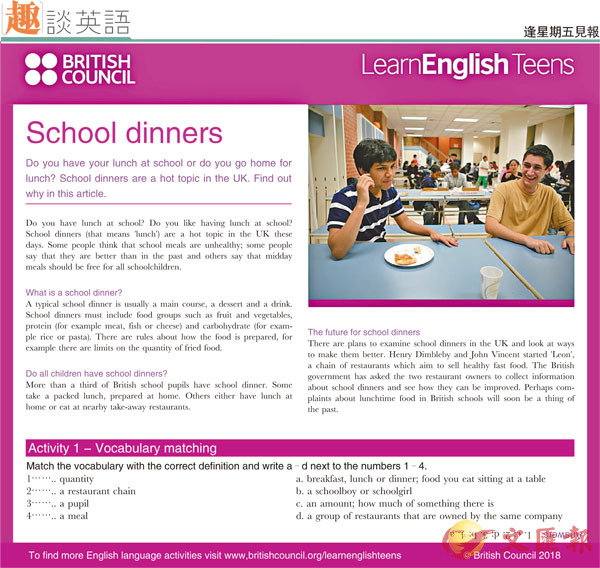
Do you have your lunch at school or do you go home for lunch? School dinners are a hot topic in the UK. Find out why in this article.
Do you have lunch at school? Do you like having lunch at school? School dinners (that means 'lunch') are a hot topic in the UK these days. Some people think that school meals are unhealthy; some people say that they are better than in the past and others say that midday meals should be free for all schoolchildren.
What is a school dinner?
A typical school dinner is usually a main course, a dessert and a drink. School dinners must include food groups such as fruit and vegetables, protein (for example meat, fish or cheese) and carbohydrate (for example rice or pasta). There are rules about how the food is prepared, for example there are limits on the quantity of fried food.
Do all children have school dinners?
More than a third of British school pupils have school dinner. Some take a packed lunch, prepared at home. Others either have lunch at home or eat at nearby take-away restaurants.
The future for school dinners
There are plans to examine school dinners in the UK and look at ways to make them better. Henry Dimbleby and John Vincent started 'Leon', a chain of restaurants which aim to sell healthy fast food. The British government has asked the two restaurant owners to collect information about school dinners and see how they can be improved. Perhaps complaints about lunchtime food in British schools will soon be a thing of the past.
Activity 1 - Vocabulary matching
Match the vocabulary with the correct definition and write a-d next to the numbers 1-4.
1........ quantity a. breakfast, lunch or dinner; food you eat sitting at a table
2........ a restaurant chain b. a schoolboy or schoolgirl
3........ a pupil c. an amount; how much of something there is
4........ a meal d. a group of restaurants that are owned by the same company
Answers 1. c; 2. d; 3. b; 4. a
To find more English language activities visit www,britishcouncil.org/learnenglishteens
(c)British Council 2018
逢星期五見報

